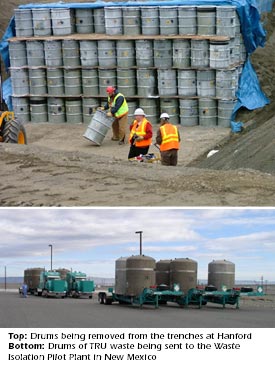|
 For
eight years, Duratek has been a major subcontractor on the
Project Hanford Management Contract (PHMC) team, which is
responsible for cleanup of the U.S. Department of Energy’s
(DOE) Hanford Site in southeastern Washington state. Fluor
Hanford is the prime contractor. For
eight years, Duratek has been a major subcontractor on the
Project Hanford Management Contract (PHMC) team, which is
responsible for cleanup of the U.S. Department of Energy’s
(DOE) Hanford Site in southeastern Washington state. Fluor
Hanford is the prime contractor.
Duratek is involved in facility operations, transportation,
and waste disposition projects across the site. One of these
is the retrieval and disposition of drums containing transuranic
(TRU) waste. TRU waste is any material (clothing, tools, etc.)
that is contaminated with radioactive elements heavier than
uranium, a naturally occurring element. In most cases, the
contaminating element is plutonium and occurred from the research,
testing, and development of nuclear weapons during the Cold
War.
At the time they were packed, the 55-gallon drums were suspected
of containing levels of transuranic material that exceeded
the DOE guidelines for on-site burial. So they were set aside
until a national repository for the permanent disposal of
TRU waste could be made available. That repository is the
Waste Isolation Pilot Plant (WIPP) in Carlsbad, New Mexico,
which opened in 1999 to receive TRU waste from DOE facilities
across the country. At the time of waste generation, the drums
were stacked on an asphalt pad up to four layers high, with
plywood boards separating each layer. They were then draped
with heavy-duty tarps and covered with dirt. Workers, wearing
appropriate safety gear such as personal dosimeters (that
measure radiation) and protective clothing/equipment, inspect
each drum for cracks and dents. They then compare the drum
number to Hanford storage records to determine what is inside
each drum. If necessary, a method of nondestructive assay
is used to verify what category of waste the contents would
fit into: TRU or mixed low-level radioactive waste. The drum
is then moved to Hanford’s Central Waste Complex, an interim
storage facility. Drums containing low-level mixed waste are
processed to meet waste acceptance criteria for burial on-site.
The drums filled with TRU waste are prepared for shipment
to WIPP for permanent disposal.
Since retrieval operations began in October 2003, Duratek
employees have retrieved 3,400 drums. Fluor Hanford expects
to retrieve approximately 6,000 of the 37,000 drums in 2004.
Dale McKenney, Duratek employee and deputy director of PHMC’s
Waste Disposal/Groundwater Remediation Project said, “The
ramp-up in retrieval operations represents significant progress
in meeting goals for Hanford Site cleanup, in particular goals
that were recently negotiated with Washington State Department
of Ecology and the U.S. Environmental Project Agency.”
Marking a record achievement, twelve shipments of TRU waste
were shipped from the U.S. Department of Energy’s (DOE) Hanford
Site in Washington State to WIPP in May 2004. “Sending twelve
shipments in one month marks a new level in TRU shipping for
us,” said Dick Wilde, vice president of Waste Disposal/Groundwater
Remediation Project, which operates the TRU Waste Program
for the Hanford Site. “A year ago, we sent three shipments
in April and that was an unprecedented achievement.” This
rise in shipments underscores the accelerated efforts to get
TRU waste off the Hanford Site and into permanent disposal.
Rick Dunn, Duratek employee and director of Fluor Hanford’s
TRU Program, said, “We made our goal of twelve shipments in
May, and we plan to sustain that rate for the rest of fiscal
year 2004.”
|

